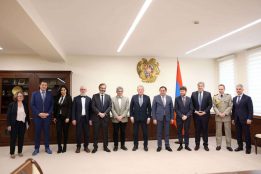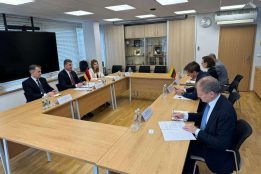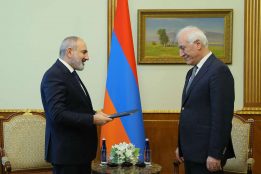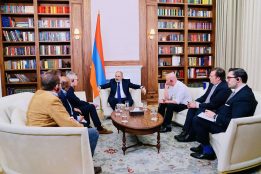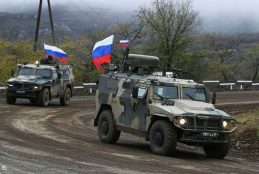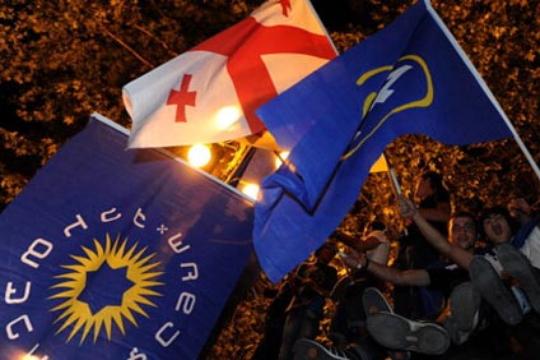
Thomas de Waal touched upon Georgia-Russia relations in his recent article published in the National Interest. Find the article below.
Much of the focus on Georgia’s recent election result has focused on the Russia question. Understandably so, because one of the few things everyone knows about Georgia’s new prime minister, Bidzina Ivanishvili, is that he made his vast fortune in Russia.
The pundits are worrying about the wrong neighbor. Nothing much is likely to change in Georgia’s relations with Russia. Its relations with Turkey are a much bigger cause for concern.
As soon as Ivanishvili’s Georgian Dream scored its decisive victory over President Mikheil Saakashvili’s governing party in the October parliamentary election, a host of commentators raised the Russia issue, with headlines such as “A Russian Victory in Georgia’s Parliamentary Election.”
Some of the most alarmist pieces came from a section of the pro-Western Moscow commentariat which had rather naively adopted Mikheil Saakashvili as its idol. Some of these comments betrayed a rather neocolonial attitude towards Georgia, a desire, to quote the famous lines of Bertold Brecht “to dissolve the people and elect another one.” Yulia Latynina printed an opinion piece entitled “The Georgian opposition has done what the Russian army could not.”
In fact, most Georgians can see a difference between the Russian army and Russian money (a lot of which is already invested in Georgia).
Ivanishvili’s Russian business background is an intriguing story. A boy from a poor family in a village in central Georgia, he lived in Russia for twenty years and made a colossal fortune there in the 1990s, now estimated to be worth more than six billion dollars, chiefly through the bank Rossiisky Kredit. He worked with some of the more controversial figures of the time, such as the Uzbek-born tycoon Alisher Usmanov. He also dabbled in politics, in 1996 supporting the presidential bid of Alexander Lebed, who went on to become Boris Yeltsin’s national-security adviser.
Ivanishvili then left Russia in 2002, first for France and then for Georgia. He has not returned to Russia since. When he entered opposition politics last year, he declared he would sell his assets in Russia, which he said comprised one third of his wealth.
But that is about as much of a story as there is. Ivanishvili was a quiet tycoon, not really deserving of the term “oligarch” because of his low public profile. Almost all of the suspicion around him is circumstantial and there are no obvious links to Putin or the Kremlin. We have much more juicy material from the biographies other Russia-based billionaires of that period, such as Roman Abramovich, Boris Berezovsky, Vladimir Gusinsky, Mikhail Khodorkovsky— or indeed the Georgian Kakha Bendukidze who served as economics minister under Saakashvili.
This is not to say there are no skeletons in Ivanishvili’s Russian closet. But if there were obvious ones, I would have expected they would have come to light and been broadcast with lurid commentary by the two pro-Saakashvili television channels, Imedi and Rustavi-2, which made a habit of smearing members of the Georgian opposition as pro-Russian. They had a whole year to come up with something.
As it is, Ivanishvili came to Georgian politics with pretty much a blank slate. The first political allies he chose were two opposition pro-Western parties and in government, he has committed himself to a pro-Western policy similar to his predecessors. And his new foreign minister said there could be no restoration of diplomatic relations with Russia as long as it had embassies in Abkhazia or South Ossetia.
The evidence of the election suggests that most Georgian voters wanted Russia to be a non-issue. In other words, they mainly worried about the economy, while not wanting to see any compromise on Georgia’s claims to its territorial integrity, including Abkhazia and South Ossetia. But a lot of Georgians also look forward to restored trade with Russia, including the return of mineral water and wine to the Russian market—something that was likely to happen anyway, following Russia’s accession to the World Trade Organization earlier this year.
The bitter political conflicts with Russia over the past 20 years have obscured a deeper historical reality: ordinary Georgians feel a closer affinity with Russians than they do with many other nationalities, including Americans. Probe below the surface and you find an older “other” in Georgian cultural attitudes: the Turks, not the Russians. Over history, the Ottomans threatened Georgian nationhood far more than the Russians did, while the Russians periodically protected Christian Georgia from Muslim Persians and Turks.
Polling by the Caucasus Barometer of the Caucasus Research and Resources Center shows that Georgians approve of Georgian women marrying Russians (41 percent in favor, 53 percent against) more than they approve of them marrying Americans or, in particular, Turks (21 per cent in favor, 74 per cent against). There were similar answers to the question of which nationality Georgians approved of doing business with.
To its credit, the Saakashvili government worked hard to combat this anti-Turkish stereotype and cultivate better relations with its most Western-looking neighbor. Earlier this year, the two countries signed a visa-free agreement by which you can cross the border with only domestic identity documents. Turkey has turned into Georgia’s biggest trading partner. In the first three quarters of 2012, trade between the two countries was worth more than one billion dollars.
Turkish money and Georgian politics fused in the Black Sea resort city of Batumi, close to their common border. Batumi was a pet project of Saakashvili, who orchestrated an extravagant building boom that cast up a Hilton, Sheraton, Radisson and a string of casinos.
Yet all this caused a backlash. Batumi was part of the Ottoman Empire until 1878 and the surrounding region still has a large Muslim population. Local nationalist politicians, aided by the Orthodox Church, began to stir up fears of a neo-Ottoman expansion into their city, of Turkish workers taking Georgian jobs and Muslims pushing out Christians. Plans to rebuild an Ottoman-era mosque, destroyed in the Stalin era, were a lightning rod for this nationalist sentiment. One local politician, Murman Dumbadze, said that if the mosque was reconstructed he would like to see it bulldozed.
If in Tbilisi Ivanishvili’s supporters had a democratic tinge, in Batumi these nationalists were at the forefront of Georgian Dream. Georgian Dream took over the parliament. Dumbadze won the parliamentary seat for Batumi.
There will now be calls to restrict Turkish immigration and Turkish trade. Turkish exports to Georgia are indeed ten times higher than the trade going the other way—a symptom of an unbalanced economy established by the previous government. But it will be a mistake if Georgia’s new government allows its nationalist wing to alienate what is currently its friendliest neighbor. This issue, not Russia, may be Ivanishvili’s first foreign-policy challenge.

















